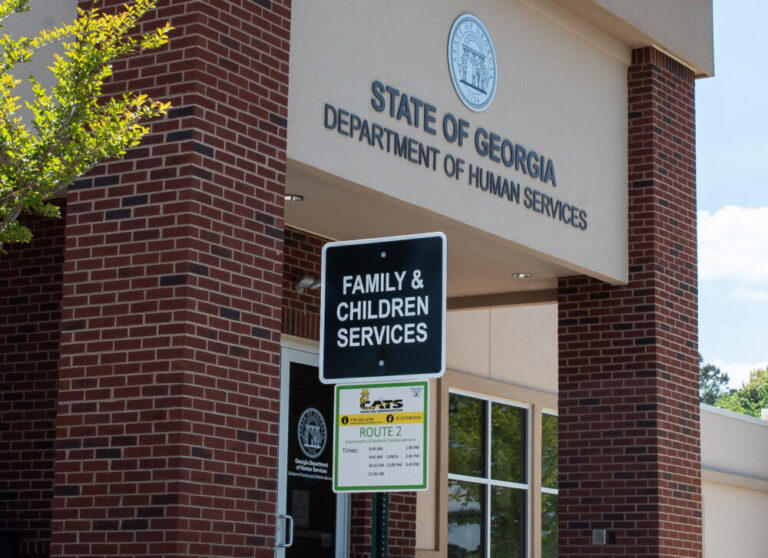
Section Branding
Header Content
Georgia Today: State of emergency, Georgia's housing crisis, foster care kids living in hotels
Primary Content
On the Friday Jan. 27 edition of Georgia Today: Gov. Kemp issues a state of emergency, Georgia's housing crisis, and foster care kids are living in hotels

Orlando Montoya: Welcome to the Georgia Today podcast from GPB News. Today is Friday, Jan. 27, and in for Peter Biello, I'm Orlando Montoya. On today's episode, the governor has issued a state of emergency in response to violent protests last weekend in Atlanta. The president of the Georgia Chamber of Commerce says we're facing a housing crisis. And Georgia foster care officials have placed more than 400 children in hotels over the past six months because they couldn't find appropriate placements for them. Those stories and more coming up on this edition of Georgia Today.
Story 1
Orlando Montoya: The Georgia NAACP and state law enforcement agencies are bracing for the release of a video showing police brutality in Memphis. The death of Tyre Nichols prompted murder charges against the officers who beat him. It also came days after the officer-involved shooting of an environmental activist in metro Atlanta's DeKalb County. Columbus activists are planning a demonstration this afternoon, citing last week's shooting. A morning statement from the FBI says the agency is working with partners statewide to leverage intelligence and resources to ensure public safety. Gov. Brian Kemp yesterday declared a 15-day state of emergency, allowing him to call up the National Guard if needed.

Story 2
Orlando Montoya: Georgia Power has been given a permit by state regulators to begin long-term storage of the toxic material left over from burning coal to make electricity at one of its shuttered power plants. GPB's Grant Blankenship explains.
Grant Blankenship: Plant Branch on Lake Sinclair between Eatonton and Milledgeville quit burning coal when it was retired eight years ago after some 50 years of operation. The permit granted by the Georgia Environmental Protection Division describes how Georgia Power will store coal ash from those decades. It runs in accordance with a rule published last year by the Federal Environmental Protection Agency, which forbids storing coal ash in direct contact with groundwater. The Plant Branch coal ash landfill will have a drain system to siphon off groundwater beneath a liner separating ash from soil plus a seal up top. Georgia Power is still pursuing coal ash storage in unlined landfills, running afoul of the EPA rule at five of its more massive sites, including at Plant Shearer in Monroe County, the largest coal-fired power plant in the nation. For GPB News, I'm Grant Blankenship in Macon.
Story 3
Orlando Montoya: Gov. Brian Kemp has approved the issuing of a quarter billion dollars in bonds to finance loans to build new housing for low and middle income residents. The order signed earlier this week puts the focus on housing affordability as companies like Hyundai, Rivian, SK Battery and QCells are investing billions of dollars on Georgia manufacturing plants that will attract new residents. Georgia Chamber of Commerce president and CEO Chris Clark says there is a housing crisis in the state.
Chris Clark: I talked to a business leader yesterday. His son moved back home, got married. His wife's a teacher. He said, Chris, there's no house in our whole town for under $600,000. Where in the world are young couples supposed to live? And so we do have a crisis. And I think there are three things that we ought to be looking at. One is how do you help young men and women save so they can get access to those houses. And so some states are doing some innovative things there. And so how can we help young men and women? No. 2 is how do you reduce the regulatory burden? I appreciate what Governor Kemp said in the state of the state about helping fund site readiness in communities where we have these projects to get housing started that jumpstarts the builders. But the other part of this, too, and quite frankly, it's on me and you, this NIMBYism that says "I only want a three-acre house built. in my neighborhood, I want a golf course." That's unrealistic for young men and women and is unrealistic for seniors. And so in a way, there's an economic case to be made here. But this is a moral issue, too. We know when men and women can buy their own home, they can move out of poverty, they can have generational prosperity. But if we stack it against them and there's no available workforce housing available there, I mean, we're just shooting ourselves in the foot and we're hurting the next generation. I read an article last week that called millennials the "Roommate Generation" and say that they were very worried that they will never be able to move out of their parents basement and never be able to live on their own. We shouldn't be satisfied with that. And so we are working with Chairman Washburn and a broad coalition of builders, Habitat for Humanity, legislators, partners — to develop ways and ideas and hopefully have some real strong policies this session to jump start this. But we're not going to solve it in a year. But particularly, we have these critical areas. We have to start now so that we can be ready to go, particularly where these plants are going to be built out in the next four years. We've got time to build the type of housing that we need in those communities.
Orlando Montoya: Clark says workforce housing is second only to workforce availability in Georgia's ability to attract new businesses. Kemp's order approved bonds for the Georgia Housing and Finance Authority.

Story 4
Orlando Montoya: Georgia foster care officials have placed more than 400 children in hotels over the past six months because they couldn't find appropriate placements for them. That's according to Department of Family and Children's Services care coordinator Audrey Brannen, who told state lawmakers Wednesday that the problem is partly due to a broken health care system.
Audrey Brannen: We are here to protect children from their caregivers who may be maltreating them. We are here to provide resources to prevent maltreatment, and we cannot do that when so many of our resources, both staff and financial, are trying to plug the holes in our health care system. It's like using your index finger to stop the leak in the Titanic. With me today is my colleague Brian Patterson, who leads a new team designated to review and represent any youth in foster care is being denied medical services. We have a team of people now, all experts trying to navigate this system, and we're failing. Me, I do this for a living. I've done this for 25 years. I'm an expert. I'm also a clinician. I can't navigate it. So this is not a DFACS issue. This is a system issue.
Orlando Montoya: At budget hearings last week, Department of Human Services Commissioner Candice Brose said she was, quote, "hell bent" on ending the practice that some have called the hoteling of foster children.
Story 5
Orlando Montoya: During those budget hearings last week, various state departments made their case for funding priorities. GPB Sofi Gratas has more on some of the health care related proposals.
Sofi Gratas: Appropriations for the state's four major health departments next fiscal year include over $7 billion for mental and behavioral health services and an expanded HIV prevention program, among others. But a top concern this year is the unwinding of a pandemic-era federal policy that's kept people on Medicaid and is set to expire in April. The Department of Community Health will work with the Department of Human Services to reevaluate over 2 million adults and kids in Georgia through next year. More than half a million are estimated to lose Medicaid coverage in the process. $8.4 million will be made available to fund additional caseworkers and administrative support for unwinding. DHS says their staff will likely see caseloads go up more than 200%. Commissioner Candace Broce also teased legislation to end so-called hoteling for foster children.
Commissioner Candace Broce: You cannot make progress on your foster care cases if you are supervising a high-needs child in the office or a hotel room.
Sofi Gratas: Meanwhile, Department of Public Health lead Kathleen Toomey plans to focus on women and children.
Kathleen Toomey: We're trying to coordinate a response across all agencies to address maternal and children's needs.
Sofi Gratas: So far, there are no additional appropriations specifically for maternal mortality. For GPB News, I'm Sofi Gratas.
Story 6
Orlando Montoya: Republicans in the Georgia Senate announced yesterday their agenda for this year's legislative session. Their goals include cutting state income tax rates and improving reading instruction for young public school students. They also voiced support for Gov. Brian Kemp's plan to spend $1 billion on state income tax rebates and $1.1 billion on property tax rebates for homeowners.

Story 7
Orlando Montoya: The Savannah College of Art and Design is partnering with the world's largest provider of professional services to give students new opportunities for real world experience. GPB's Benjamin Payne reports.
Benjamin Payne: The building that once housed Georgia's oldest hospital, Candler Hospital, is now called Deloitte Foundry. That's where the Savannah College of Art and Design, commonly known as SCAD, is launching several new initiatives with London-based Deloitte in which students can collaborate on real world projects with the global consulting firm and their clients. Paul Stonick is an administrator at SCAD.
Paul Stonick: We'll have new studios, new opportunities for students to be recruited, and a new opportunity for students to really dig into new types of technologies, whether it's immersive reality, blockchain, NFT, and it gives them an opportunity to really understand what the future looks like and really provide Deloitte an opportunity to expand their thinking in their creativity and innovation.
Benjamin Payne: SCAD's partnership with Deloitte began informally in 2019, but the new Deloitte Foundry marks what the school calls a new chapter. For GPB News, I'm Benjamin Payne in Savannah.
Orlando Montoya: And that's it for today's edition of Georgia Today. If you haven't yet hit "subscribe" on this podcast. Take a moment right now and keep us current in your podcast feed. And if you got feedback, we'd love to hear it. Email us at GeorgiaToday@GPB.org.
I'm Orlando Montoya. We'll see you next week.
GPB's Georgia Today newsletter hits your inbox on Tuesdays, Wednesdays and Thursdays with top stories from around the state featuring news, politics and more. Subscribe here.



